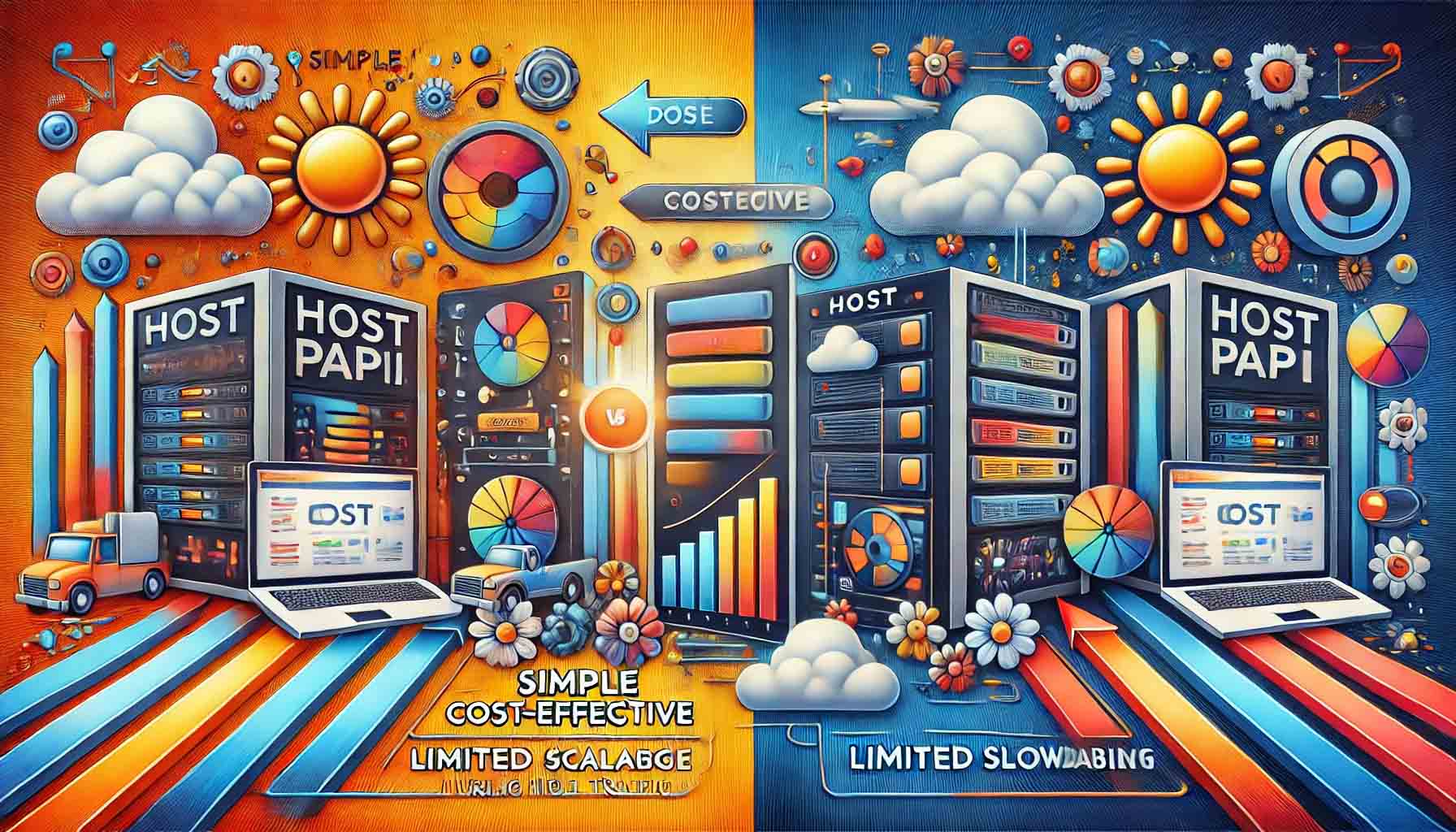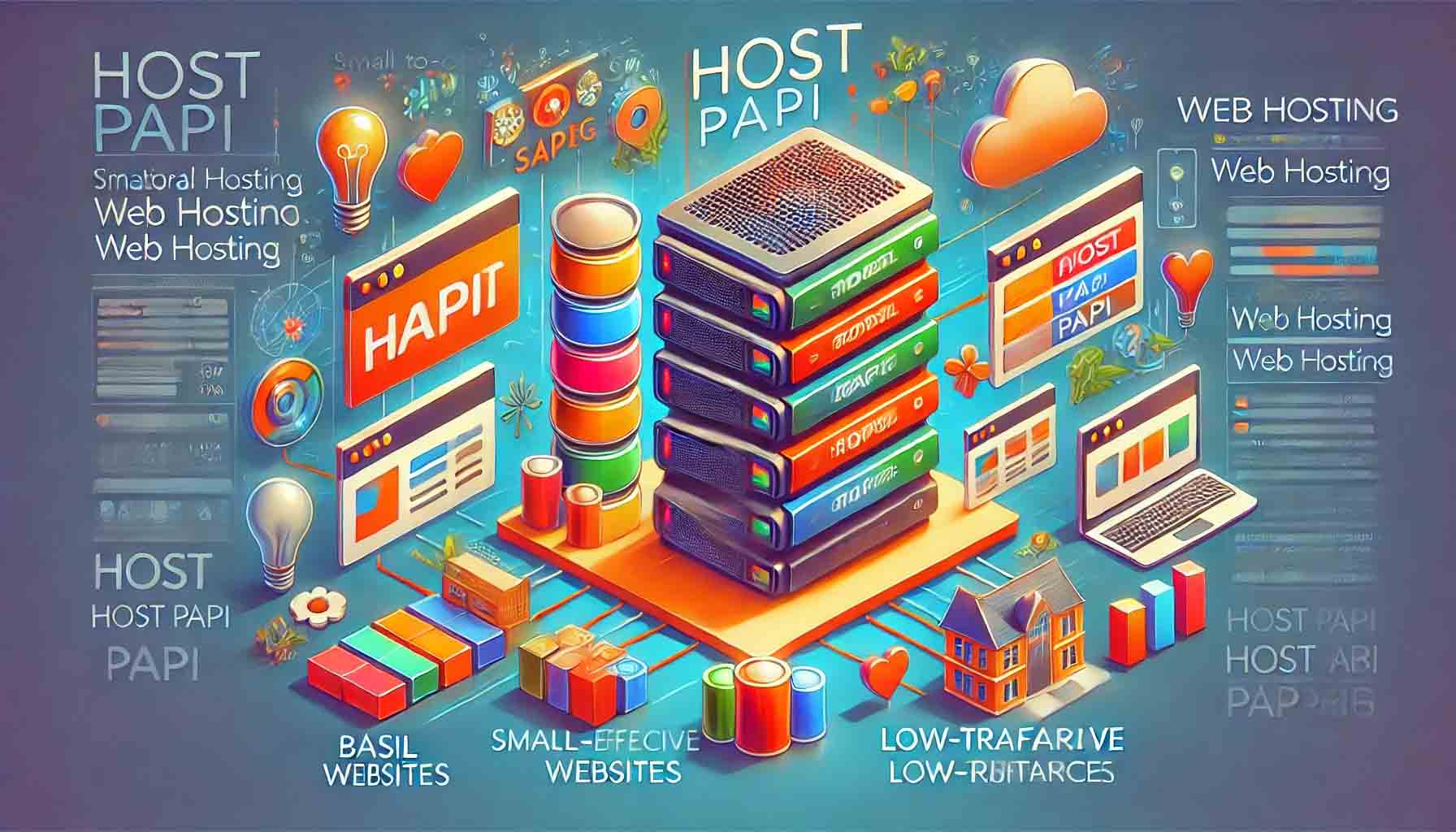
The world of technology is developing at an amazing speed, and the solutions needed to maintain an online presence are also constantly changing. In 2024, there are several options for running websites, but the most frequently asked question is still which is the ideal choice: traditional web hosting or modern cloud services?
While traditional web hosting is a stable and well-proven solution, cloud services take flexibility and scalability to a new level. Today, this choice is not only a technological issue, but also a strategic decision, as different solutions suit different needs.
Our goal with this article is to provide an overview of the two approaches and help you find the solution that best suits your unique needs – whether you're a small blog, a growing business, or a high-traffic e-commerce site.
Below, we take a detailed look at the advantages and disadvantages of traditional web hosting and cloud services, and what trends can be expected in this area in 2024.

What is traditional web hosting?
Traditional web hosting is the earliest form of hosting websites and includes solutions such as shared hosting, dedicated servers, or the VPS (virtual private server). In this system, web pages are served by a central server that allows data to be stored and web pages run in a specific physical location.
Shared hosting
The most common solution is shared hosting, where multiple users share the resources of a single server. This economical choice is ideal for smaller websites as it comes with low costs. However, performance also depends on other users on the server, which can result in slowdowns during busy periods.
Dedicated servers
THE dedicated servers in this case, the customer gets his own server, which is completely optimized for his needs. This solution is more expensive, but provides more freedom and better performance, since there is no need to share resources with other users. Ideal for high-traffic or resource-intensive websites.
Server architecture and operation
The server architecture of traditional web hosting is centralized: one or more high-performance physical machines provide the necessary resources in the data center. These data centers are designed to run continuously, keep data secure, and serve visitors reliably. Traditional hosting usually has dedicated bandwidth and power supply to keep the servers running smoothly.
Historical overview
Traditional hosting has been around since the beginning of web hosting and became widely available in the 1990s with the massive spread of the Internet. In the beginning, this was the only solution to ensure an online presence. In recent decades, with the spread of cloud services, the popularity of traditional storage has declined, but it still plays a significant role in certain segments, especially if one knows exactly what hardware resources one needs.
Traditional web hosting is therefore still a relevant option, but it is increasingly supplemented or replaced by more modern, cloud-based solutions, which are presented in detail in the rest of the article.

What is cloud storage?
Cloud-based storage is a modern, dynamic solution in which resources are not located on a single physical server, but run on a set of different servers through distributed virtual systems. This distributed infrastructure allows users to scale resources on demand, which is especially useful for larger sites or services where traffic may fluctuate.
Operating principle and scalability
Cloud storage is basically a flexible model in which data and applications are stored on multiple servers, even in different geographical locations. This not only reduces the risk of server failure, but also provides easy access to additional resources. Scalability is one of the biggest advantages of cloud storage: resources such as processor, memory or storage can be increased or decreased at any time with just a few clicks.
In 2024, this flexibility will be especially important as the online world becomes increasingly complex. Websites provide not only static content, but also interactive applications and real-time data that require fast and continuous scaling.
Development of cloud services and their current role
The market for cloud services has exploded over the past decade. Amazon Web Services (AWS), Microsoft Azure and Google Cloud Platform (GCP) are all key players, and the value of the global cloud market could reach $600 billion by 2024. This is due to the growing popularity of cloud services, especially in the enterprise sector, where flexibility and data security are key.
According to a study, 94% of businesses already use some form of cloud service, and nearly 30% of IT spending is directed to the cloud. This clearly shows that cloud-based solutions are not just a trend, but have become an essential part of online services.
The cloud therefore offers advantages not only for large companies, but also for small and medium-sized enterprises and individuals. The ability to increase or decrease resources as needed can be a real competitive advantage, as costs can be optimized more effectively.

Advantages and disadvantages of traditional web hosting
Advantages
- Usually cheaper, especially for smaller websites: Traditional web hosting offers an economical solution for smaller websites, especially with shared hosting. Running a website is available from a few euros per month, which can be an attractive choice for start-up blogs or simple company sites. The low price is a clear advantage that makes a digital presence easily accessible.
- Simpler administration and user interfaces: Traditional hosting services often offer user-friendly interfaces, such as the popular one cPanel. These platforms are easy to use, even for those without deep technical knowledge. For example, cPanel allows you to manage websites, databases, e-mails and domains with a single click.
- A more tangible hardware environment: Many people find it more reliable if they know that their site is running on a specific server. The controlled environment of physical servers and tangible hardware still provide security for many, as they know exactly where and how their data is stored.
Disadvantages
- Limited scalability: One of the biggest disadvantages of traditional hosting is that it is difficult to keep up with increasing traffic. A sudden increase in traffic can easily overload the server, causing longer response times or even downtime. Expansion often requires manual intervention and costs can increase significantly.
- Longer stops or slowdowns during traffic spikes: One of the biggest risks of shared hosting is that the server's resources are used by several websites at the same time. If another website experiences an unexpected increase in traffic, it can affect all users. This can result in slower load times and occasional outages, resulting in a user experience makes it worse.
- Resource limitations: With shared hosting, each web page can only use a certain amount of resources, such as storage, processor or memory. Once your website exceeds these limits, you may experience performance issues or be charged for the extra resources.

Advantages and disadvantages of cloud services
Advantages
- Scalability: One of the greatest strengths of cloud services is dynamic scalability. If a website's traffic suddenly increases, the cloud automatically provides the necessary resources without the need for manual intervention. This is especially important in 2024, when a business's online presence changes frequently. According to a survey, 74% of companies choose cloud-based solutions because of their flexibility.
- Flexibility: Cloud-based solutions adapt perfectly to changing needs. Users can quickly and easily increase or decrease the resources they use, depending on what they need at any given moment. In this way, costs and performance can be optimized, since you only pay for what you use.
- High availability: Cloud services typically use multiple data centers around the world that are redundant and thus minimize downtime. Using multiple data centers means that if there is a problem in one center, data traffic is automatically redirected to another center. Large cloud providers such as Amazon Web Services (AWS) or Microsoft Azure typically guarantee 99,99% of availability.
- Resource allocation: With cloud services, you only pay for the resources you actually use. This pay-as-you-go model can be extremely cost-effective, especially for those running applications with variable traffic.
Disadvantages
- Pricing complexity: While scalability and flexibility are great benefits, paying for resources based on consumption can be complicated. Pricing structures are often based on several factors (storage, data traffic, computing capacity, etc.), so it is difficult to calculate the total costs in advance. For some companies, this can lead to unexpectedly high bills if they don't keep a close eye on the resources used.
- Technical complexity: Managing cloud services may require more technical knowledge than traditional hosting solutions. More complex administration and the possibility of multiple configurations can be a challenge for those who do not have advanced IT skills. This often requires additional training or expert help.
- It's a matter of data protection: In the case of cloud services, the data is stored in data centers operated by a third party, which can create distrust. Although large service providers have strong data protection standards, there is always the risk of unauthorized access to data. Data protection and legal compliance are extremely important in 2024, when global data management regulations are becoming increasingly strict.

When should you choose traditional web hosting?
Choosing traditional web hosting can be ideal in several cases, especially if your needs are simple and you are looking for a cost-effective solution. Let's see in which situations traditional storage can be the optimal decision.
1. Small or medium-sized websites with low traffic
If you run a website that experiences relatively low traffic, such as a personal one blog or the introduction page of a small business, traditional hosting can be an ideal choice. Such sites usually do not require a large amount of resources and can easily be served on a shared hosting. Costs can be kept low while your website has all the necessary functions.
2. Personal projects or start-ups where cost-effectiveness is a primary consideration
The cost-effectiveness of traditional hosting can be particularly attractive to those who are just starting a new project or business. At the start, it is not certain that you will have to count on a lot of traffic, so it would be unnecessary to choose more expensive cloud-based solutions. Shared hosting has low monthly costs and allows you to build your online presence on a budget.
3. Simple websites that do not require a large amount of resources
Simple websites, such as static pages or websites with smaller databases, require few resources. In the case of such a site, traditional hosting can be an excellent solution, since the scalability or complex resource management offered by cloud services is not required.
Statistical background
According to a 2023 survey, more than 50% of SMBs still use traditional hosting due to cost effectiveness and ease of management. Although cloud services are becoming more popular, traditional hosting still provides a solid foundation for those who don't need complex solutions.

When should you choose cloud storage?
Choosing cloud-based hosting is especially worthwhile if you are dealing with high traffic, changing needs or modern web applications. Let's see when this technology should be preferred:
1. High-traffic websites that may need to scale quickly
If your website's traffic spikes significantly from time to time - for example during a promotion, campaign or holiday season - cloud services offer an ideal solution. Through scalability, cloud services are able to dynamically increase or decrease resources, ensuring that your website always provides optimal performance. E-commerce sites with high traffic, such as Amazon, have been taking advantage of the scalability of cloud services for years, as they can operate continuously even during peak traffic periods.
2. Business projects where high availability is key
For business-critical projects, such as online stores, financial services or global communication platforms, high availability is essential. Cloud services usually operate with multiple data centers that ensure continuous operation. This redundancy allows the system to automatically switch to another if one data center goes down, avoiding downtime. According to Gartner, more than 50% of the cloud services market will be in the business sector by 2024, as companies increasingly demand 24/7 availability.
3. Modern web applications, SaaS services that require flexibility and dynamic resource allocation
SaaS (Software as a Service) services and other modern web applications also greatly benefit from the flexibility of the cloud. These applications operate with ever-changing resource demands, and the cloud can quickly respond to those demands. Cloud-based infrastructure allows these services to be available globally, providing high performance regardless of users' geographic location.
Facts and Statistics
According to a 2023 IDC report, the global cloud market grew by 20% from the previous year and is expected to grow further in 2024 as more and more businesses migrate to cloud-based solutions. In addition, 94% of enterprises use some form of cloud, which reflects flexibility and reliability.

2024 trends in web hosting and cloud services
In 2024, there are several important trends in web hosting and cloud services that will determine the future of the industry. These trends reflect not only technological progress, but also responses to environmental and economic challenges.
1. Hybrid solutions: combining traditional and cloud services
More and more businesses are using hybrid solutions that combine traditional server-based hosting with the flexibility of the cloud. This approach allows companies to keep sensitive data on their own servers while using the cloud for scalable, dynamic resource allocation. Hybrid solutions are growing in popularity because they provide both security and flexibility, giving companies the opportunity to optimize operating costs and increase performance.
2. Environmental aspects: the rise of green technologies
In 2024, environmental protection will play an increasingly important role in cloud services. Large providers such as AWS, Google Cloud and Microsoft Azure are increasingly switching to green solutions, such as using renewable energy sources to run their data centers. Reducing the carbon footprint is also becoming more and more important for website owners, so choosing green hosting services can be beneficial not only from an ethical but also a marketing point of view. According to a 2023 study, the carbon footprint of data centers will account for about 1% of the world's energy consumption, so a shift to green technologies will be key in the next years.
3. The role of AI and automation
Artificial intelligence and automation are taking cloud services to a new level. Systems using AI are capable of optimizing the operation of data centers, analyzing user behavior, and intelligently distributing resources. Automation makes management easier and reduces problems caused by human error. For example, machine learning can help predict the load on servers, thus minimizing the chance of downtime and increasing system efficiency. According to IDC, by 2024, 70% of cloud services will integrate some form of AI and automation tools to increase performance and reduce operating costs.

As the digital world evolves faster and faster, a web hosting solutions its selection also became a strategic decision. When choosing between traditional web hosting and cloud services, you need to consider your unique needs, budget, and future growth.
Summary of the most important aspects of the election
- Traditional web hosting: Ideal for smaller, low-traffic websites that require simpler management and low costs. These solutions are recommended for those who do not need to scale resources to a large extent and who are looking for a reliable, stable environment.
- Cloud storage: For websites with high traffic and continuous growth, the cloud offers the greatest flexibility and scalability. Cloud services enable dynamic resource expansion and provide high availability, making them suitable for modern web applications and SaaS services.
Recommendations for different types of users
- Small businesses and personal projects: Traditional shared hosting can be an economical and simple solution.
- Large companies and websites with increasing traffic: Cloud-based solutions are the best choice if flexibility and rapid scalability are important.
- Hybrid solutions: For those who want the best of both worlds, hybrid hosting provides the flexibility of the cloud and the security of traditional hosting.
Future prospects
After 2024, technological development will continue to accelerate. Incorporating AI and automation into cloud services continues to improve efficiency and reduce costs. The pursuit of sustainability further strengthens the spread of green technologies in data centers, while hybrid solutions are gaining more and more space by combining security and flexibility.





